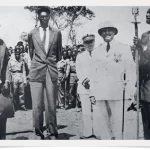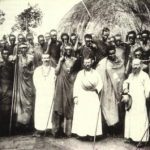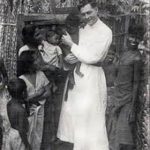The Court, the Church, and the Colonial Administration: The Mpumbika Affair
With the uprising put down and no other crisis, of similar magnitude in view, the Court tried to discourage the interest in the missions it had been fostering for six months. This was easily done with the Tutsi of the Save area: those who had frequented the mission during the critical months, apparently only because ordered to do so, soon stopped visiting the Fathers. Many of the Hutu, however, having once been given the opportunity to develop ties with the powerful Europeans, were not anxious to return to complete dependence on their Rwandan lords. Pressed by the Court and notables to visit the missionaries, they had been forced to overcome their initial fears about them; after several months of contact with the Fathers, they became convinced of the advantages of continued association with them. When the notables found their orders to cease visiting the mission were having little effect, they resorted to threats and force, which were more successful. By August 1901 attendance of the Hutu had declined enough for the Fathers to be concerned about it.
The situation in Gisaka presented the Court with more formidable problems of control and diplomacy. Although Rukura was safely disposed of, the Court understood the depths of dissatisfaction among the people and indigenous notables of Gisaka, and it dreaded the emergence of a new rebellious leader. Most afraid was Ruhinankiko, who incorporated the interests of the Court and those of Rwandan notables holding domains in Gisaka. Of all the Rwandans with commands in the area, he had been the most discredited by the uprising because the Abarasa, which had led the rally to Rukura, was one of the army regiments assigned to him.
Among the Gisakan notables who had not fled to Burundi, most feared that the Rwandan notables would use the uprising as an excuse to deprive them of even more of their domains, whether or not they had participated in the rebellion. Many were so afraid of reprisals by their Rwandan superiors that they did not even dare visit them to pay court or receive orders. Of the notables who had escaped to Burundi, some were quietly beginning to pave the way for a peaceful return to their homes while others were still hoping to rekindle the flames of revolt. Some of these notables had taken refuge with Cyoya, who was obviously an enemy of the Rwandan Court.
All parties—the Court, the Rwandan batware, the notables of Gisaka (whether at home or in exile), and even Cyoya—sought the support of the Fathers at Zaza. Although the missionaries had stood with the Court against Rukura, the Court and Rwandans feared (and the notables of Gisaka hoped) that they might be persuaded to change their stand. During the months following Rukura’s retreat, all the contenders courted the Fathers with visits, compliments, gifts of cattle and ivory, and the provision of men and material for the construction of their station. One ofthe most skillful was Mpumbika, a descendant of a mwami of Gisaka. He commanded several hills, including that of Zaza, and his friendly compliance with the desires of the missionaries eventually assured him of their support. Mpumbika apparently had been one of the notables most implicated in Rukara’s uprising. Apart from his alleged involvement in this affair, his growing alliance with the Fathers and his potential strength as a leader – he had many supporters in the province of Mirenge, where the Zaza mission was located – caused alarm and hostility among the Rwandan notables. Ruhinankiko, eager for a scape-goat and anxious to stamp out any desire for independence among the notables of Gisaka, came to see Mpumbika as a serious threat to the Rwandan Court.
In March 1902 the Court executed several men of Gisaka and pillaged others who were accused of plotting revolt. Then, with tension rapidly growing in Gisaka, the Court summoned Mpumbika to Nyanza. The endangered notable convinced the Fathers that the Court was certain to kill him if he went. Perhaps too tied to Mpumbika to realize the gravity of their move, the Fathers undertook to protect him. They wrote to the Court to plead his case, in the meantime advising him to stay in Gisaka. The Court refused the Fathers’ appeal and insisted that Mpumbika be sent to Nyanza within a month. With his refusal to answer this summons, Mpumbika set himself apart as a mugome, a rebel. The Court announced that by associating himself with Mpumbika in this refusal the Father Superior was also a rebel, and so it forbade all the notables of the area to have any further contact with the mission.
The Father Superior wrote to the German officer at Bujumbura and to his own superior, Bishop Hirth, for assistance. In the meantime, as the people of Mirenge province began preparations to fight in support of Mpumbika, the Fathers began to realize the seriousness of the situation. When the Court sent an envoy to make a local investigation, the Fathers sent back with him a message that they believed was conciliatory: the mwami was master in his own country and could do as he wished, provided that he did not make war; that, the Fathers could not allow.
Not reassured by this message, the Court decided to try to use the Fathers of Save against the Fathers of Zaza. It delegated Kayijuka, long since restored to the favor of the missionaries, with the gift of a cow and calf, to explain its position to the Save Fathers. When Kayijuka urged them to continue supporting the Court against any local Gisakan leader, the Fathers affirmed their intention to do so. Two weeks later, in an effort to ease the tension between the Court and the Zaza mission, one ofthe Save Fathers replaced the Father Superior of Zaza. En route to Zaza, the new Father Superior visited the Court to assure it of his absolute neutrality in the “rather delicate” situation in Gisaka. But once in charge of the mission, the Father Superior found it impossible to disengage from the commitments his predecessor had already made. The next month he wrote to the Save Fathers asking them to intercede at Court to prevent Mpumbika from losing command of the hill Zaza. With the new Father Superior thus engaged in the cause of the Gisakan notables, the number of people coming to Zaza to complain against the Rwandan notables grew each day. Apparently receiving no satisfaction on the question of who was to command the hill Zaza, the Fathers barred some of the mwami’s cattle from pastures on the hill. This move must have caused shock and anger at Court; after all, did the land finally belong to the Rwandan mwami or to the Catholic Fathers? The Court asked the Save Fathers to see that the cattle were returned to the pastures and to warn their colleagues at Zaza about the notables of Gisaka who were trying to sow discord between the Court and the missionaries.
By July the Court had decided to resolve the Mpumbika case. The mwami recalled forty of his cattle that Mpumbika held from him, saying he no longer wanted him as a client since he clearly preferred the support of the White Fathers. The Father Superior realized that he could not handle this issue personally, so he sent Mpumbika to present his case to Captain von Beringe, who had recently been appointed district officer at Bujumbura. Mpumbika apparently argued his case well, since he returned with a letter to the Court indicating that he was not to be deprived of his cattle.The mwami appealed once more to the Fathers at Save, asking them if he could no longer do as he wished, if he were no longer master in his own kingdom? At the same time the Court sent off sixty envoys to present its side of the case to von Beringe.
The envoys spent two months paying court to the German officer and returned to Rwanda only in September when von Beringe himself came to visit the mwami. By this time the officer was undoubtedly fully informed of all the royal complaints about both the people of Gisaka and the White Fathers. He came with instructions from the governor of German East Africa to cooperate completely with the mwami, whom he was to regard as the ultimate authority in Rwanda. He was not to interfere in Rwandan internal affairs except at Musinga’s request.When the Father Superior of Save learned that von Beringe was at Nyanza, he went to ask him to permit the founding of a new station, preferably at the Court, and to order the mwami to build schools nearthe present stations and to encourage his people to attend them. The Fathers, who had heard that von Beringe was friendly to the missions, were astonished that he refused all their requests. He replied that were they to establish a station at Nyanza, the Court would simply move away; that the Fathers had enough stations in Rwanda for the moment in any case; that to build schools would serve no purpose; and that the mwami could neither prevent nor encourage his people to learn each was free to do as he wished. Even more surprising was that the officer supported the Courts demand that Mpumbika come to Nyanza at once and sent three soldiers to see that the summons was obeyed. Before leaving to continue on to northern Rwanda, von Beringe did assure the Father that Mpumbika need spend only two months at Court, performing the customary services for his ruler; he would later return to Gisaka, still with hills to command, although the number might be reduced since the mwami felt that he had too many.
Confident of German protection after these victories over the Fathers, the Court moved to make an example of Mpumbika. Although it merely imprisoned the notable himself, thus observing German wishes that he not be harmed, it executed fourteen of his clients and friends as soon as Mpumbika and his entourage arrived from Gisaka. The executions were supposedly ordered by Ruhinankiko and were carried out by one of his favorites.In November the campaign against the notables of Gisaka continued within Gisaka itself, with several more killed, wounded, or pillaged. The Zaza Fathers, who greatly regretted the execution of Mpumbika’s men, in part because they saw that their prestige would suffer because of it, became involved once more. “Doing everything possible to prevent a war,” the Fathers protected some notables and saved the property of others, including that of Mpumbika, who was still held prisoner at the Court.
When von Beringe learned of the killings, he ordered his subordinate Lieutenant von Parish, who was stationed at Shangi, to investigate the case. Whether from convenience or from a desire to give an impression of solidarity with the missionaries, von Parish held his inquiry at Save. After concluding that the Court was responsible for the slaughter of men whose safety had been implicitly guaranteed by von Beringe, von Parish traveled to Nyanza in early January 1903 to impose a fine of forty cattle on the mwami. Musinga protested that he had not even known of the killings until after they were over. Mpumbika himself supported the testimony of the mwami and asked that he not be fined for the killings. This may well have been one case proving the truth of theproverb ntihica umwami hica rubanda: “It is not the mwami who kills, it is his followers.” But when von Parish continued to insist that Musinga must take ultimate responsibility for the actions of his subordinates, even for a subordinate as powerful as Ruhinankiko, the mwami yielded and paid the fine.
https://uk.amateka.net/the-court-the-church-and-the-colonial-administration-the-mpumbika-affair/https://uk.amateka.net/wp-content/uploads/2022/11/father.jpghttps://uk.amateka.net/wp-content/uploads/2022/11/father-150x150.jpgMissionary historyWith the uprising put down and no other crisis, of similar magnitude in view, the Court tried to discourage the interest in the missions it had been fostering for six months. This was easily done with the Tutsi of the Save area: those who had frequented the mission during...BarataBarata rpierre@ikaze.netAdministratorAMATEKA | HISTORY OF RWANDA



